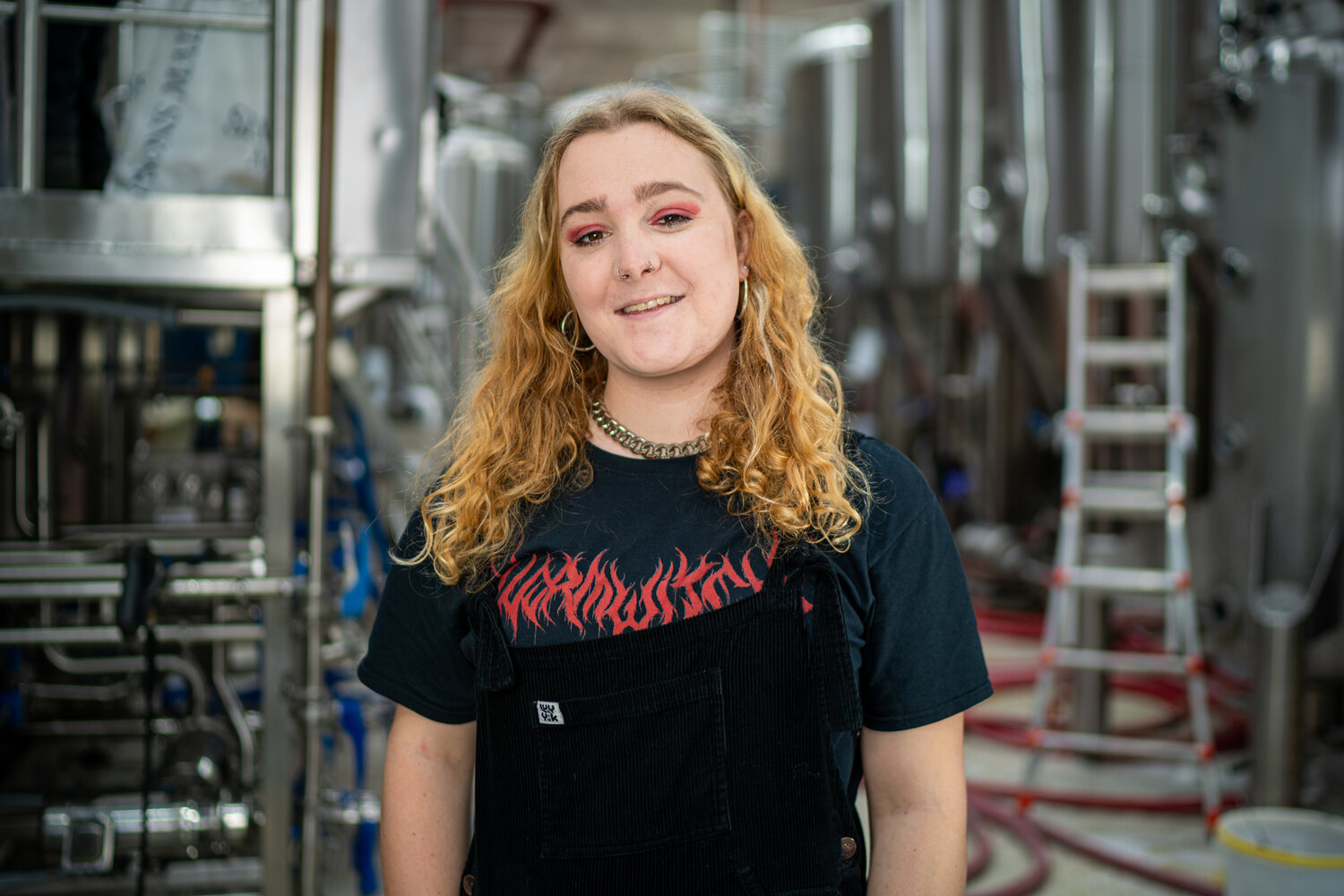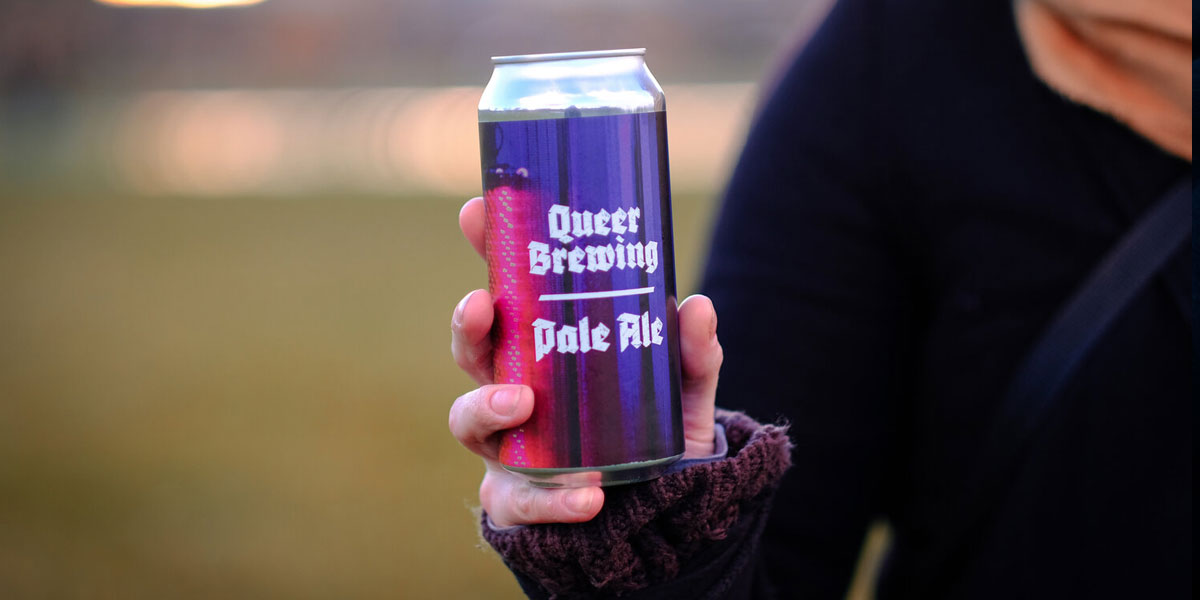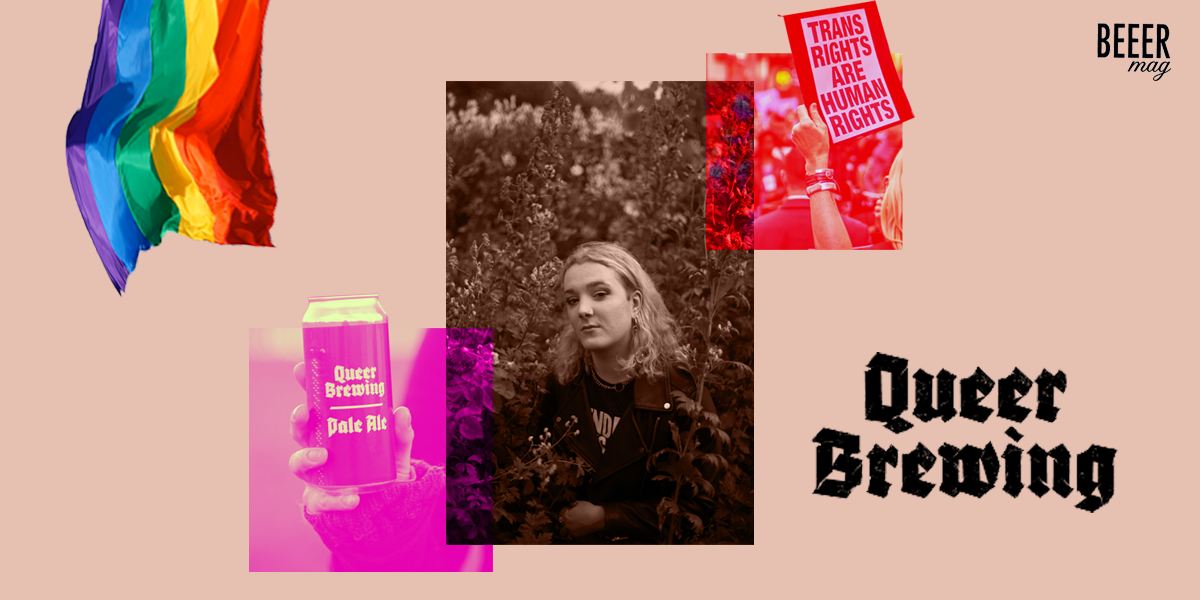Words by Francesco Pattacini
Lily Waite is a British transgender artist and one of the most respected and influential journalist in craft beer. Awarded with Beer Writer of the Year just a year ago by the British Guild, in 2019 she founded Queer Brewing Project (here the webesite) to give a voice to the LGBTQ + community within and beyond the craft world, defending its rights and introducing a discourse on equality and inclusion in places often hostile or lacking in discussion around these topics, as well as raising money for LGBTQ + charities through earnings from the sell of beers.
To carry out this project Lily Waite did not found a brewery but created a network of widespread collaborations that start with Dinosaurs Will Die, the first beer prepared for Manchester Beer Week together with Marble Brewery. In a short time Lily Waite began touring the UK, Europe and the United States (told in particular on Pellicle), involving over 20 breweries including Cloudwater, New Belgium, Our Mutual Friend, Amager Bryghus and Salt Beer Factory and arriving to create a line of three beers (Tiny, Existence as a Radical Act and Tiny Dots) avaible for sale on the site and in UK.
When we speak, Lily Waite tells us the reasons that led her to act after years of wondering how to do it, moving from writing to action and the path necessary to give visibility and recognition to the LGBTQ+ world in beer and beyond:
I’ve worked in beer for about 5 years in a number of roles from bartending to managing a bottle shop, to social media and then writing. I began writing about beer for my now-defunct blog Craft Queer whilst working in a bottle shop, focusing on diversity and inclusion and the intersections of queerness and transness with the beer industry. After a while, I grew tired of so much discussion—about what could be done to make the beer world a better and more diverse and inclusive place—without action. I wanted to do something that would have a tangible impact, providing visibility and representation whilst also raising money for LGBTQ+ charities. The Queer Brewing Project was the result of that desire.

Diversity and inclusion are fundamental themes especially for craft beer which is experiencing a very fast path of affirmation in cultural terms. The reasoning around these issues, especially in relation to what happened in the United States few weeks ago, shows the need to redefine one’s own paradigms to create an increasingly inclusive reality that takes on social aspects and a path of emancipation. This argument, as Lily highlights several times, does not refer only to the craft beer world but to the society as a whole, and Queer Brewing aim to create not only an alternative in terms of products but to guarantee opportunities, equality and accessibility for all, marking a turning point and trace a path where this does not happen.
The first reactions were great: so many people were supportive and exciting about what I was doing, partially because it gave them something to rally behind and support. A lot of people want the industry to improve and be a better space, but aren’t sure how to do so. Queer Brewing, amongst other projects, acts as a lightning rod for that and gives people something to get behind. For LGBTQ+ people in beer, too, it seemed that it was a relief, perhaps, to have a brand that represented them, or that they could see themselves in.
It is not a question of ‘beer’, at least not only. Of course it is through the production and sale that Queer Brewing creates a result in terms of awareness and empowerment, an instrument to support benefic realities and projects but Lily emphasizes that this is not a mirror project that limits itself to giving recognition to the LGBTQ + people. Indeed, in some respects, Queer Brewing wants to act in reverse, to establish an example starting from collaboration with breweries, to make it take a very specific part and to counteract the increasingly widespread practices of slacktivism, an increasingly widespread trend among brands in using social and emancipation themes to clear one’s conscience or, simply, sell more: «I don’t necessarily think that representation in products is the most important thing—it’s certainly not the end goal and to focus on it solely is a mistake, one fuelled by neoliberalism and capitalism. I loathe when big brands or corporations put a pride flag on a product just for Pride month (June), and don’t think that a brand marketing toilet paper to trans people, as a hypothetical, would represent me any more than it would yourself. I don’t see what we do as representation in products, exactly, so much as I see it as representing queer and trans people in who we are. The fact that we make beer is secondary to that: the brand itself is about who we are and what we stand for, and that’s what people see themselves in.»
Representation is a complex process, of course, and it follows a series of levels and passages that those who do not belong to these communities cannot actually fully understand without staining themselves with inauthenticity. We therefore ask Lily Waite in which space Queer Brewing wants to act, how it orientates itself in this difficult question, what are the feelings that accompany it and why it is important to make it clear to the whole community: «Representation is about seeing yourself in something and finding pride, or strength, or recognition in that. Seeing yourself reflected in something—beer, a car advert, an organisation—works in a number of ways: it makes you feel less alone, it makes you feel part of something larger than yourself, and it makes you feel recognised. That’s why our brand is so explicitly queer: whilst the majority of our audience is cisgender or heterosexual by nature of the beer industry, we’re not speaking to cishet people. We’re speaking to LGBTQ+ people because we know the power that that visibility and representation can have. In terms of what ‘you’ or other people can do to help this change, you can’t be that representation for communities you’re not part of—inauthentic representation is commonly offensive, and misguided at best—but you can make space for that, and support brands and people making that change. Buy our beer!»
As we said, the process of recognition and support does not happen only on one side and clearly cannot and not want to end with an action of self-emancipation. The fact that Queer Brewing is a collaborative project gives a broader indication of the path that Lily Waite wants to chart. Involving breweries is also a way to bring this change to the places, realities and people within them. That is, to form a network and a community that decides which side to take, which applies itself to produce and support this revolution to support it and expand the potential of the message itself:
It’s incredibly important that this work isn’t just done by us, and by other people like us. All too often to work is left to those who need the change most; marginalised people are almost always tasked with undoing and combating their own marginalisation. It would be a pointless endeavour if it were only us doing what we’re doing, that’s why it began as a collaboration project, to bring others in, especially those without LGBTQ+ team or staff members. I began by reaching out to some breweries I knew—working as a writer and for a beer festival company means I know (what feels like) most of the industry—and finding collaboration partners wasn’t hard. I still do reach out to breweries, but equally they reach out to us.

Queer Brewing and existence as a radical act
In Lily’s words and in the actions that distinguish Queer Brewing there is this deep desire to act and make a difference, to subvert the idea that everything is guaranteed because it is guaranteed to a predetermined majority for whose the question of recognizability is not an important theme and with strictly political and social connotations. That habit, in a broad sense, of assuming that a certain type of sector or reality does not need to change and revise their positions. Existence as a Radical Act is not just a name for a beer but it is the will to define and declare a huge problem of exclusion in which existence itself becomes a weapon that must lead to the breaking of certain habits. We are referring above all to that widespread idea according to which certain topics should not be treated because – after all – it is only about beer, or because a product must first of all be good and not also be the bearer of a message of positivity. Among many, these are the walls that continually hinder inclusiveness and the possibility of seeing progress to come. We talk with Lily about this sense and the political value inherent in the choices we make at the counter as in everyday life:
The idea that politics doesn’t belong in beer is nonsense. Everything is political: from where you buy your food to your relationships with your friends and family. The choice to drink craft beer over Peroni or Budweiser is a political decision. To say we should just focus on production overlooks the individuals involved in production, and is an arrogant and reductive viewpoint.
An important turning point for Queer Brewing was certainly the arrival on the shelves of Tesco, which arrived a few weeks ago thanks to Cloudwater (which also makes possible the production of the 3 Queer Brewing beers) with the 4-box of Beer with Big Ideas, a initiative that aims to give visibility and promote projects and breweries led by minorities and communities often considered or considered invisible, especially by large consumers. A revolutionary moment from many points of view that introduces that discourse of responsibility and recognition we were talking about before, as well as giving Lily’s project a fundamental impetus for its future:
That our beer is now in the largest supermarket in the country is a big deal. To our knowledge, this is the first time the word ‘queer’ has ever been on supermarket shelves, and the potential for visibility and representation is huge. All of the profits from the collaboration 4 pack is going to the collaborating breweries—one queer-owned and two Black-owned breweries, and one Indian-owned alcohol free brand—and this will have an enormous impact on the future of our businesses. This could, if things go well, mean we can set up our own brewery in a few years, which might have been impossible without this.
Go beyond words
In From Both Side, which Lily Waite publishes in 2018 on Good Beer Hunting, recounting her own experience of transition, of the changes and differences that occurred in the moment when it ended («Since living “as a woman,” the difference in how I’ve been treated has been hugely noticeable. When I was read as male, my opinions were worth more than those of my female colleagues. I was trusted more, I was given more respect, and I was rarely spoken over. Whilst I was in a position in which I was acutely aware of my male privilege, others are not. I believe privilege is one of the starting points at which to begin to combat sexism (amongst myriad other social issues).»), the problems we are talking about today are already emerging. When we discuss it together Lily is clear in saying that, although this article was perceived as a real indictment, being bounced and ending up in the center of the discussions, after an initial clamor and promises of change everything has stopped.
It is a bitter observation that, fortunately, did not stop Lily but that has removed many people and many resources from the world of beer. A fact that will carry over in Buckled Knuckles, a sort of ideal sequel in which Lily evaluates how the promised and advocated changes never actually happened: «Exasperatingly little has changed since I wrote “Both Sides.” At the time, numerous people claimed it would “change the industry.” But when I periodically write different versions of the same article about being queer in beer, the answers I get from queer and trans people about our roles and experiences in this industry have varied little from those first interviews I conducted in 2017. There are still too few of us, there’s still too little representation, there’s still too little training, education, or support. The same conversations are still being had on “diversity panels” by the same few faces. And so, uncomfortably, here I am. Again. Still.».
It is an important index, a sentimental thermometer that shows how that very existence as a radical act is once again worth more and how hard it is to fight to receive the attention you are entitled to as human beings. It is a demonstration of the importance of Queer Brewing and of how this battle does not only refer to one side but has all the will to build an enlarged community. Therefore, questioning the general domination not to eliminate what has been built but to make it more open, more positive, more alive. Beer, as she herself tells us, will not change the world but this does not mean that it should be excluded from this type of reasoning or that it cannot actually bring support:
I don’t think for a second that beer is what will start this change, or that it will change the world on its own, but it absolutely has the potential to be part of that change. It means a lot that you think that From Both Sides made everyone rethink action and inclusivity, but I think the reality is very different, precisely because not much has changed. In fact, I wrote a follow up to that article last year on Good Beer Hunting called ‘Buckled Knuckles’, in which I discussed how little has changed. I think there’s a great number of people fighting for change—more so than in 2018 when I wrote the piece—but the majority of people remain apathetic, or more charitably, at least uncertain of how to help. There does remain a vast proportion of the industry that is happy with how things are, because it suits who they are as people, predominantly cisgender, heterosexual white men. Sometimes it’s hard to see any way in which the industry will change. Sometimes it feels more positive.
Diversity has been a key component in craft beer production since its origins. We talk about diversity as an enrichment starting from the ingredients, from the areas in which it is produced, from the ideas and experiences that characterize the creative processes to the sensations it triggers in those who drink it. The voices and richness of craft beer lie precisely in the diversity and making it more accessible, fairer and more inclusive are fundamental points for continuing its evolution.
Lily Waite and Queer Brewing represent a fundamental element in this process which, alone, will not be able to close the discussion. It is increasingly necessary to find oneself in these areas and in these discussions, to produce a positive message not as a matter of visibility but to counteract the barriers of silence. It is in moments when these needs do not seem to exist that discrimination, whether involuntary or passive, lurks. It is in these spaces that these necessary changes take place. Even in Italy, right in our country, where the issue of gender, emancipation and protection of diversity seems a taboo subject, opposed by the darkest parts of politics that aim to bury a first step like the DDL Zan and that position Italy, according to the latest analysis by ILGA Europe, in thirty-second place in the protection, integration and inclusiveness of LGBTQ + people in Europe, the scenario for change opens up.
—
More English articles can be find here

